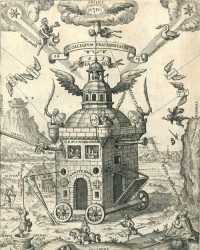Alchemy
From The Art and Popular Culture Encyclopedia
|
"Briefly speaking, the hypothesis assumed by the alchemists was this: all the metals are compounds, and the baser contain the same elements as gold, contaminated, indeed, with various impurities, but capable, when these have been purged away, of assuming all its properties and characters. The substance which was to effect this purifying process they called the philosopher's stone (lapis philosophorum), though, as a matter of fact, it is always described as a powder—a powder red-coloured, and smelling strongly. Few of the alchemists, however, venture on a distinct statement that they had discovered or possessed this substance. The arch-quack Paracelsus makes the assertion, of course; unblushing mendacity was part of his stock-in-trade; and he pretends even to define the methods by which it may be realized. Unfortunately, to ordinary mortals his description is absolutely unintelligible. Others there are who affirm that they had seen it, and seen it in operation, transmuting lead, quicksilver, and other of the inferior metals into ruddy gold. One wonders that they did not claim a share in a process which involved such boundless potentialities of wealth!""--Witch, Warlock, and Magician (1889) by William Henry Davenport Adams "I affirm, as the main thesis of my concluding labours, that Freemasonry is neither more nor less than Rosicrucianism as modified by those who transplanted it into England. At the beginning of the seventeenth century many learned heads in England were occupied with Theosophy, Cabbalism, and Alchemy: amongst the proofs of this [...] above all [the work] of Robert Fludd. Fludd it was, or whosoever was the author of the Summum Bonum, 1629, that must be considered as the immediate father of Free-masonry, as Andrea was its remote father."--"Historico-critical Inquiry into the Origin of the Rosicrucians and the Freemasons" (1824) by Thomas De Quincey |

Illustration: The Invisible College of the Rose Cross Fraternity
|
Related e |
|
Featured: |
In the history of science, alchemy (Arabic: الخيمياء, al-khimia) refers to both an early form of the investigation of nature and an early philosophical and spiritual discipline, both combining elements of chemistry, metallurgy, physics, medicine, astrology, semiotics, mysticism, spiritualism, and art all as parts of one greater force. Alchemy has been practiced in Mesopotamia, Ancient Egypt, Persia, India, and China, in Classical Greece and Rome, in the Muslim civilization, and then in Europe up to the 19th century—in a complex network of schools and philosophical systems spanning at least 2500 years.
Contents |
See also
Other alchemical pages
- Alchemical symbol
- Alchemy in art and entertainment
- Alembic
- Alkahest
- Astrology and alchemy
- Berith
- Jakob Boehme
- Circle with a point at its centre
- Duality
- Elixir of life
- Emerald Tablet
- Robert Fludd
- Four Humors
- Gold water
- Hermeticism
- Homunculus
- Michael Maier
- Musaeum Hermeticum
- Paracelsus
- Philosopher's stone
- Quintessence
- Herbert Silberer
- Vulcan of the alchemists
- Monas Hieroglyphica
Alchemy and psychoanalysis
Other resources
Related and alternative philosophies
- Western mystery tradition
- Internal alchemy
- Astrology
- Necromancy, magic, magick
- Esotericism, Rosicrucianism, Illuminati
- Taoism and the Five Elements
- Xiuzhen
- Jing Qi Shen
- Asemic Writing
- Kayaku-Jutsu
- Acupuncture, moxibustion, ayurveda, homeopathy
- Anthroposophy
- Psychology and Carl Jung
- New Age
- Tay al-Ard
Substances of the alchemists
- lead • tin • iron • copper • mercury • silver • gold
- phosphorus • sulfur • arsenic • antimony
- vitriol • cinnabar • pyrites • orpiment • galena
- magnesia • lime • potash • natron • saltpetre • kohl
- ammonia • ammonium chloride • alcohol • camphor
- Acids: sulfuric • muriatic • nitric • acetic • formic • citric• tartaric
- aqua regia • gunpowder
- carmot
Scientific connections
- Chemistry
- Physics
- Synthesis of noble metals
- Nuclear transmutation
- Scientific method
- Protoscience, Pseudoscience, and Anti-science
- Obsolete scientific theories
- Historicism

